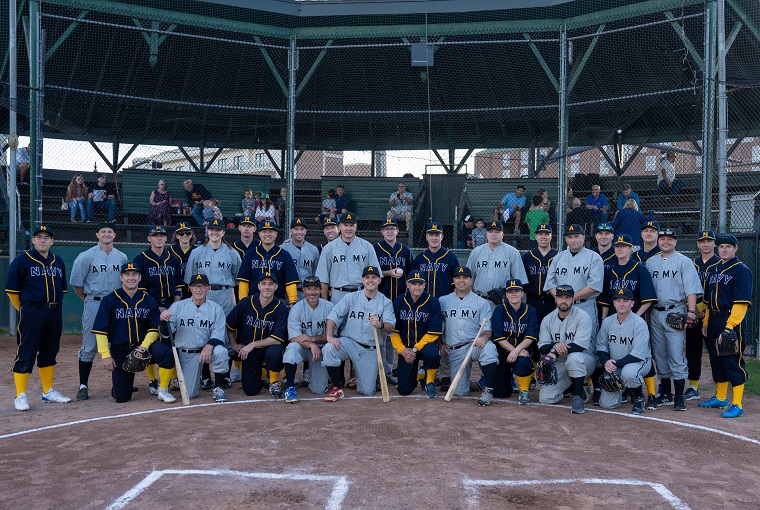U.S. Naval War College Hosts Sixth Annual Cardines Classic Army Navy Baseball Game

NEWPORT, R.I. - The U.S. Naval War College (NWC) hosted its sixth annual "Cardines Classic" baseball game at Cardines Field in downtown Newport, Oct. 6.
Designed to be both fun and educational, the event commemorates American servicemembers’ involvement in World War I and the Navy’s commitment to international partnerships.
“A little more than 100 years ago, my predecessor, Admiral William S. Sims - hosted King George V of Britain for the great baseball game between U.S. Army and Navy forces in Europe during the First World War,” said Rear Adm. Pete Garvin, president of NWC. “This tribute to those who gave all in service to our great nation is a fitting reminder of their sacrifices and service.”
This year’s game was organized in coordination with the Naval War College Foundation, the Pritzker Military Museum and Library, the Congressional World War Centenary Commission, the Newport Gulls, the City of Newport, Naval History and Heritage Command and other tenant commands onboard Naval Station Newport.
The Cardines Classic is based on an Army Navy baseball game originally organized on July 4, 1918, by Rear Adm. William S. Sims, then commander of U.S. Naval Forces in Europe and former president of NWC. At a time when U.S. forces arriving on the Western Front were met with skepticism, Sims saw baseball as a way to encourage trust and camaraderie between Entente forces. The effort was successful and even caught the attention of King George V, who regularly attended games, referring to baseball as a symbol of the reconstitution of transatlantic relationships built on a foundation of shared values.
Based on Sims and baseball’s contributions to international relations, NWC maintains a yearly tradition of reenacting the first game. Army and Navy students from NWC dress in period-accurate baseball uniforms and compete at the historic Cardines Field.
“Our annual Cardines Classic baseball game played on Cardines Field provides an immersive experience for current military and naval service practitioners to recognize the transcendent themes which connect us to the past,” stated David Kohnen, Ph.D., Cmdr., U.S. Navy, retired. He added that Cardines Field was named as such by Mrs. Anne E. Hitchcock Sims - Sims’ spouse - to honor the life of U.S. Army Private Bernardo Cardines, an Italian immigrant to Newport who played at the field before he joined the Rhode Island Army National Guard and was killed in action during World War I. “The field stands today as a reminder of the cost of war.”
Cardines Field is recognized by Major League Baseball as the oldest continuously used baseball park in the United States. Initially named Basin Field, the original backstop dates back to 1908.
Today, NWC continues outreach efforts to solidify relationships with America's maritime partners and foster greater interoperability with their naval forces.
Through its International Programs (IP) department, NWC facilitates the education of approximately 200 international students from over 75 nations every year. Each officer is greatly influenced by the cross-cultural experience and forms strong and lasting bonds with U.S. and international classmates. Once graduated, officers maintain these bonds via participation in IP’s global alumni network of more than 50,000 military and government leaders around the world, complete with international events, online networking platforms, and online resources.
To commemorate baseball’s significance in American history, “To Win or Lose All: William S. Sims and the U.S. Navy in the first World War” is on exhibit at the historic NWC Museum. The exhibit explores the Navy’s role in securing victory for the Allies during the First World War and includes information and objects from the baseball game in London. The museum is open Mondays through Fridays from 10:00 AM to 4:00 PM or by special appointment.
NWC delivers excellence in education, research, and outreach, informing today’s decision-makers and educating tomorrow’s leaders. The college provides educational experiences and learning opportunities that develop students’ ability to anticipate and prepare strategically for the future, strengthen the foundations of peace, and create a decisive warfighting advantage.
